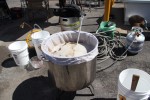It is St. Patrick’s Day, time again to endure the tasteless annual outbursts of shamrock-mounted hokum fueled by green-colored lager. The Irish among us somehow manage to tolerate it with good humor and eternal grace, even if the fact remains that a vast majority of American revelers on Amateur’s (Day and) Night Out never give a second thought to the history and culture of the island.
It’s a fascinating story. Ireland’s experience in WWII was the topic of this 2007 essay, originally blogged in 2007, now rewritten and updated.
—
Roguish, hirsute and gravelly voiced, Ronnie Drew (1934-2008) founded the Irish hard folk band called the Dubliners. If not the purest of singers, he was a gifted storyteller in the island’s famous oral tradition.
It is difficult to imagine a more appropriate set of vocal chords for wrapping around the spoken introduction to “McAlpine’s Fusiliers,” a song written by Dominic Behan, multi-talented brother of the more boisterous and notorious writer Brendan. This song, arguably Dominic’s most famous, considers the experience of Irish laborers in Britain during the Second World War.
‘Twas in the year of ‘thirty-nine when the sky was full of lead, when Hitler was heading for Poland, and Paddy for Holyhead
Holyhead is the Welsh ferry port directly across the Irish Sea from Dublin, Paddy is longstanding slang for an Irishman, and the song refers to the curious fact that with nary an interruption, the Irish diaspora originally prompted by the 19th-century potato famine continued according to its traditionally sad cadence throughout the horrendous international conflict, officially known within the fledgling Irish Republic not as a “war,” but as the “emergency.”
These semantics point to the anomaly that Ireland, minus its Ulster flashpoint, maintained strict neutrality throughout the catastrophic 20th-century European conflagration. The resulting situation was surreal at best, and for some, it symbolized a typically Irish response to calamity.
Diplomatic representatives of all warring nations were posted to Dublin in close proximity, Irish newspapers were censored to achieve fairness and balance for all warring nations, and the chief unintended consequence of neutrality’s isolation was the near complete collapse of an already weak economy, as vast numbers of male citizens migrated to an active belligerent (Britain), either by choice or circumstance, and became de facto combatants through war-related work or military service.
When the war was over, the questions arose: Had Ireland’s leader, Eamon de Valera, heroically preserved its shaky independence by adhering to neutrality, or had his hedging retarded the country’s standing in the post-war community of nations?
Were the Irish being traitorous to their acquired Anglo heritage by embracing neutrality, or were they as yet crafty Gaels, taking the only truly sane position in an utterly insane world?
In “That Neutral Island: A Cultural History of Ireland during the Second World War,” author Clair Wills thoughtfully surveys the length and breadth of the Irish experience during those troubled times. Now forgotten to Americans, the controversies engendered were extreme matters of life and death, especially for Britain during the Blitz. Irish independence was new, untested and in all respects a work in progress, and ties with the mother country still were painfully palpable. It was awkward, indeed.
Wills balances larger geopolitical issues by documenting the smaller nuances of everyday life in Ireland during the “emergency.” This requires a measure of probing, if superficially, the depths of the Irish collective psyche, a task toward which untold millions of pints of Guinness have been drained for more than two hundred years without resolution. Coldly sober, she does quite well, dispassionately considering the many contradictions coexisting on the island before and since her period of focus.
During Europe’s war, unexpected consequences were in abundance in Ireland. Life became even tougher for the long suffering rural poor, who were enlisted into make-work schemes like a bizarre program calling for escalating quotas of peat to be cut (it was burned for fuel). This strikes me as eerily similar to Fidel Castro’s propaganda-laden sugar cane drives of the 1960s – and about as ineffective.
All the while, Ireland’s hotels and resorts remained packed, catering to a wealthy British clientele traveling to an otherwise impoverished country to eat and drink extravagantly, avoiding the inconvenience of dinnertime bombing at a time when rationing and austerity were norms back home.
Meanwhile, Catholic priests railed against the depravity of Europe, holding out a mystical vision of an autonomous, corporatist Ireland, one making good on the model of Salazar in neutral Portugal. The church feared the deleterious contagion of condom-carrying American GI’s temporarily billeted in Northern Ireland prior to the climactic Normandy invasion. Rigorous censorship was damaging to Ireland’s writers and artists, who were cut off from previously fecund streams of continental inspiration.
Even stranger, Ireland even had its own hardscrabble fascist cadres, although comparisons with the Marx Brothers in “Duck Soup” are more appropriate than the actual dimensions of the threat posed to civil order by these confused and disorganized elements.
—
I’m unwilling to pass judgment and render a verdict as to the ultimate significance of Irish neutrality during the “emergency.” In the end, it took the Allied victory, membership in the European Union, a vast transfer of wealth under the auspices of the EU and another half-century of effort (plus millions more pints of Guinness) for Ireland to even begin shaking the mixed legacies that can be traced back to the famine, a full century before the wartime period covered in Wills’ book.
Not to mention the subsequent bursting of the property bubble, the world’s most recent recession, and the hurling of Ireland back down the ladder, initiating another long slog uphill. Back to the wartime migrant workers:
I’ve worked till the sweat it has had me beat
With Russian, Czech, and Pole
On shuttering jams up in the hydro-dams
Or underneath the Thames in a hole
I’ve grafted hard and I’ve got my cards
And many a ganger’s fist across my ears
If you pride your life don’t join, by Christ!
With McAlpine’s fusiliers
Don’t forget a pint of stout while listening to this and other great Dubliners tracks, and always avoid green beer at all costs.
Sláinte.
(photo credit: NME.com … Ronnie Drew is seated on the bottom row, right)





